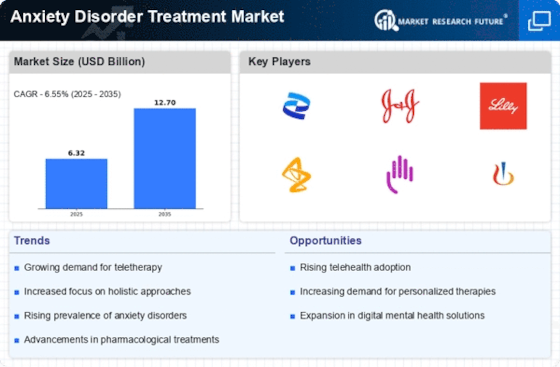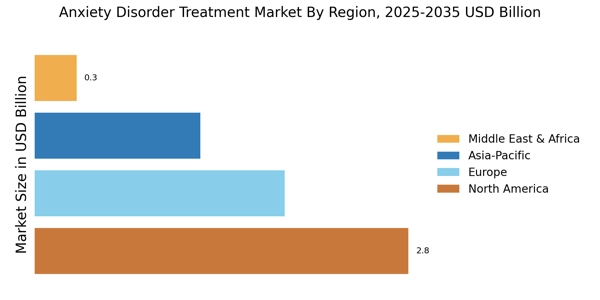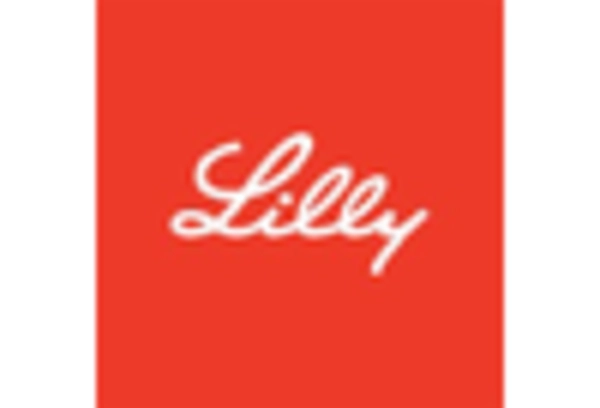Advancements in Pharmacological Treatments
Innovations in pharmacological treatments are significantly influencing the Anxiety Disorder Treatment Market. The development of new medications, including selective serotonin reuptake inhibitors (SSRIs) and novel anxiolytics, has expanded the therapeutic options available for patients. Recent data suggests that the global market for anxiety disorder medications is projected to reach USD 4.5 billion by 2026, reflecting a compound annual growth rate of 5.2%.
These advancements not only improve treatment efficacy but also reduce side effects, making them more appealing to patients. Additionally, ongoing research into personalized medicine may lead to tailored pharmacological approaches, enhancing treatment outcomes. As a result, the Anxiety Disorder Treatment Market is poised for growth, driven by the continuous evolution of drug therapies that cater to diverse patient needs.
Increasing Prevalence of Anxiety Disorders
The rising incidence of anxiety disorders is a primary driver for the Anxiety Disorder Treatment Market. Recent estimates indicate that approximately 31.1% of adults experience an anxiety disorder at some point in their lives. This growing prevalence necessitates effective treatment options, thereby expanding the market.
As awareness of mental health issues increases, more individuals seek help, contributing to the demand for various treatment modalities. The Anxiety Disorder Treatment Market is likely to see a surge in demand for both pharmacological and non-pharmacological interventions, as healthcare providers strive to address this pressing public health concern.
Furthermore, the increasing recognition of anxiety disorders as significant health issues by governments and health organizations may lead to enhanced funding and resources for treatment, further propelling market growth.
Growing Acceptance of Mental Health Awareness
The increasing acceptance of mental health awareness is a crucial driver for the Anxiety Disorder Treatment Market. Societal attitudes towards mental health have evolved, leading to a greater willingness among individuals to seek treatment for anxiety disorders.
This cultural shift is supported by various campaigns and initiatives aimed at reducing stigma associated with mental health issues. As more people recognize the importance of mental well-being, the demand for anxiety treatment options is likely to rise. Furthermore, the integration of mental health services into primary healthcare systems enhances accessibility, encouraging individuals to pursue treatment.
This trend is expected to bolster the Anxiety Disorder Treatment Market, as healthcare providers adapt to meet the growing needs of an increasingly aware population.
Regulatory Support for Mental Health Initiatives
Regulatory support for mental health initiatives plays a pivotal role in shaping the Anxiety Disorder Treatment Market. Governments and health organizations are increasingly recognizing the importance of mental health, leading to the implementation of policies that promote access to treatment. For instance, initiatives aimed at integrating mental health services into public health systems are gaining traction, which may enhance funding and resources for anxiety disorder treatments.
This regulatory backing is likely to foster an environment conducive to market growth, as it encourages healthcare providers to expand their offerings. Additionally, the establishment of guidelines for best practices in anxiety treatment may further standardize care, improving patient outcomes and driving demand within the Anxiety Disorder Treatment Market.
Technological Integration in Treatment Modalities
The integration of technology into treatment modalities is transforming the Anxiety Disorder Treatment Market. Digital health solutions, such as mobile applications and online therapy platforms, are becoming increasingly popular among patients seeking convenient and accessible treatment options.
Data indicates that the teletherapy market is expected to grow significantly, with projections suggesting it could reach USD 2 billion by 2025. These technological advancements not only facilitate remote access to therapy but also enhance patient engagement through interactive tools and resources.
As technology continues to evolve, the Anxiety Disorder Treatment Market is likely to benefit from innovative solutions that cater to diverse patient needs, ultimately improving treatment adherence and outcomes.

















